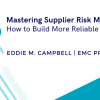Given the attention on Bitcoin, the underlying blockchain technology has been brought to the forefront for organizations looking to explore the benefits and feasibility of managing the supply chain. The level of trust, transparency, and efficiency promised by this technology opens the possibility of revolutionizing how we handle transactions.
With the successes of Ethereum and the popularity of Bitcoin the big question is, can blockchain technology pave the way for transforming the supply chain? Can the traceability promised by this technology change how companies and industries track sourced goods from their origin point to the end consumer? Can it disrupt the way we design and operate our future supply chain? Can it make our supply chain more efficient? With the global pandemic, it has become more apparent that traceability of the supply chain is an essential consideration for organizations heavily reliant on the movement of goods and services.
Bitcoin Technology Background
After Bitcoin's inception over a decade ago, many were skeptical about the digital currency, and Bitcoins struggled in the market, barely attracting any investors. However, in 2013, Bitcoin's value rose from a mere ~$13/BTC in January to an astounding peak of ~$979 by November. By the end of 2017, the price stood at an all-time high of $20,000.
Now, in 2020, even with the pandemic-induced volatility experienced by the market, it is at $11,000, still a staggering amount. Many nations that were resistant and almost hostile to this technology just a couple of years ago are now turning to it in determining the future of currencies. The sentiment change marks a significant shift in the understanding of this technology and its capabilities.
It makes one wonder what has caused this investment to be so unique and attractive within such a short period, and why does it continue to generate such keen interest? Following the enormous success of Bitcoin, many companies, industries and researchers have been relentlessly looking at other areas where blockchain can be applied, including in the supply chain.
But why supply chain? Why do experts see the supply chain as one of the most compelling use cases for blockchain? The answer is apparent when we consider how conventional supply chains remain the most complex operations to handle. They are slow, disjointed, and sometimes wholly unreliable. The global pandemic brought awareness of how our cross-border economies are intertwined and have brought tremendous complexities to our transactions. Supply chain processes deemed to be resilient and controlled became unsustainable and unreliable. It also brought a realization that not doing something about it can damage reputations and kill businesses.
Today, it is common for a product to be produced in Asia, packaged in Europe, and sold in America with the trail of origin and movement being almost impossible to decipher quickly. The pandemic-induced disruptions in the supply chain have made this issue very evident, with organizations shocked by learning that their supply chain was indeed affected.
>>Learn about the journey to enterprise-wide transformation with intelligent automation.<<
With this lack of visibility and understanding, how can we ensure the security of supply and ascertain the quality of sourced goods? As designed and operating for a long time, it is technically impossible in the current supply chain model. As new entrants continue to shape the market or with M&A activities, the uncertainty level of the supply chains grows even further. With the traditional supply chain, the coordination of the information, tracing the flow of materials or goods, and finance across each of the components continue to be extremely challenging and untenable for sustainability in the future. So, this is where blockchain can be beneficial in solving these problems.
Can blockchain improve supply chains?
To start, let's understand what exactly blockchain is and how it works. Blockchain is essentially a decentralized database that holds records of information or events in a tamper-proof way. These records allow many users to access, assess and add more data to the source. However, they can't change or erase the original data source. Since the first data stays constant, it provides a lasting, open data trail and chain of exchanges. Blockchain technology enables the ability to provide proof of transaction records throughout its life.
Every business yearns for a collaborative system for transportation, logistics and distribution, which is the premise of an Enterprise Resource Planning (ERP) system. However, ERP implementations have been less practical and have become costlier with the investments made over the decades. ERPs still aren't as effective or efficient to provide these insights even with more investments.
Blockchain technology can help lower costs, reduce waste, prevent overproduction and ensure that customers are more content with a product, price and service. The technology can help bring cutting-edge competitiveness to the marketplace.
The ability to track each transaction real-time both securely and transparently across the supply chain will transform the future distribution and delivery models. Blockchain is essentially a digital spreadsheet that will allow us to track our products and transactions across the entire eco-system throughout its life-cycle.
Today's Supply Chain Challenges
Blockchain is a technological innovation that offers an improved approach to record transactions in a secure, transparent and auditable manner, with both sides of the participants undergoing simultaneous execution. Since the records are updated automatically, very few or no intermediaries are involved.
Blockchain's underlying foundation is a decentralized ledger, resulting in every transaction being visible, transparent, traceable and therefore verifiable. Using blockchain, since all processed exchanges are immutable and irrevocable, results in bringing more reliability to the transaction, making the technology more resilient than existing methods.
Since it requires almost no intermediaries with transactions relying on computing power for validation, it will reduce the previous attendants of trust along the chain. The removal of multiple layers of the many touchpoints will increase productivity and efficiencies while significantly reducing the overall cost of transactions.
The Modern Supply Chain Network
The modern supply chain network partners are worldwide, multi-layered and have closed frameworks. As simple as this may look, numerous inherent challenges encompass today's supply chain—these range from lacking end-to-end visibility to counterfeits to not knowing the safety and quality. There are still many constraints and potentially unnecessary costs in where, when and how products are made, distributed and financial payments between parties. This supply chain hugely relies on trust and not control. Many prominent organizations have faced hefty consequences in fines and reputation due to a lack of accountable and auditable supply chain processes that encourage fair trade.
The global pandemic, a catalyst to improve our existing supply chain approaches to bring traceability and accountability, has led organizations to seek solutions using technology. The adoption of blockchain technology can become the framework to solve these supply chain issues from the point of origin of the raw materials to when it reaches end-of-life.
Benefits of Blockchain Technology
The challenges faced by current supply chains relate to information sharing and trust. However, with the transparency of the blockchain-enabled process, it will be easier to access all the critical data regarding transactions, even with the massive amount of information tracked.
Blockchain can quickly link physical products to serial numbers, bar codes, digital tags, RFID and more to help companies create a supply chain map. This map traces the movement of goods, a change from the varied methods that organizations use today to locate products. A blockchain-enabled system can make critical information available in real-time that is currently very difficult to gather and understand, such as:
- Gaining material origination knowledge
- Visibility to product safety
- Identifying counterfeit goods
- Tracking of environmental and social responsibilities
Given the effective fraud detection processes integrated into the technology, counterfeit goods will be a thing of the past. A consumer will have the confidence to know and verify that the branded goods they have purchased are indeed genuine. Brands can better track their products through the supply chain to ensure handling through authorized channels. It will improve brand reputation defense capabilities when counterfeit products show up in the marketplace. Besides, with the blockchain technology's transparent features, what will be something that one has to hide?
Blockchain can also help with improving the purchasing, logistics and shipping processes. It can help automate and track purchase orders, change orders, receipts, shipment notifications and other trade-related records that stay maintained through the supply chain movement.
Currently, these records are altered by individual organizations that choose to modify them for their internal processes, making it challenging to connect the same information. We have all dealt with the challenges of something as simple as supplier name being input incorrectly in a system of record. While seemingly so simple, this small variation tends to cause several downward inefficiencies in the supply chain processes and systems. Perhaps it was because an organization didn't think a supplier name would need more than 50 characters in the future, or maybe the dated system cannot accommodate it. These variations create inefficiencies that refrain us from quickly identifying that we are dealing with the same supplier across the chain. In other examples, imagine being able to have critical information at our fingertips, such as:
- Accurate cost data
- Real-time shipping and logistics status
- Transaction settlement progress
- Automating planning, purchasing and logistics through a single source of truth
Streamlining and automating a complete end-to-end process using a secure blockchain would lead to faster processing, lower costs and a big win for the supply chain. With all exchanges being immutable, it can help build the trust between the two involved parties. Having this trust and enhanced connectivity will improve the security and safety of products in the market, allowing us to support more responsible and accountable economic growth globally through:
- Having an audit trail for transparency and better governance
- Accessibility to information for enforcement of tariff and trade policies
- Bringing visibility to product safety issues with the finished goods or materials sourced
Final Thoughts
Large organizations that lack agility or forward-thinking vision tend to be left behind by others that use technology to transform and disrupt traditional business models. It's not a matter of if but rather when. We have all seen these repeated with Kodak, Blockbuster Video and where Amazon sits in the supply chain today. Transformative leaders are already thinking about how blockchain can be leveraged within their supply chain to reap the benefits so that they are not left behind.
The benefits of blockchain to manage the supply chain for enterprises are many and holds the key to working collaboratively with others to optimize the flow of goods, the complex flow of information, and financial transactions. Since blockchain can finally help bridge the gaps in the conventional supply chain processes, undoubtedly, its early adopters will reap big rewards from embracing it.









